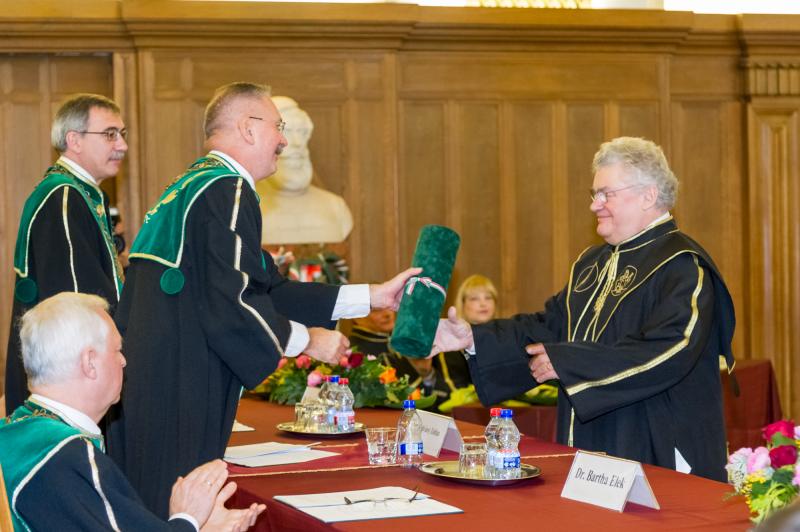Dr. Szöllösi-Nagy András díszdoktori avatása a Debreceni Egyetemen 2015. november 28.
 Szöllösi-Nagy András professzor 1949-ben született Budapesten. Szöllösi-Nagy András a Budapesti Műszaki Egyetemen 1972-ben kapott építőmérnöki diplomát mezőgazdasági vízgazdálkodás szakon. 1991-ben a Magyar Tudományos Akadémia doktora címet szerzett az új strukturált sztochasztikus real-time lefolyás előrejelző modellek elméletének kidolgozásával. 1994-től rendes egyetemi tanár a BME-én. 1989-ben nevezi ki az UNESCO főigazgatója a párizsi székhelyű vízügyi tudományok osztálya igazgatójává és egyben az UNESCO kormányközi Nemzetközi Hidrológiai Programjának (IHP) titkárává. 2009-ben nevezik ki a Delftben, Hollandiában székelő UNESCO-IHE Institute for Water Education rektorává. A professzor úr alapító tagja a World Water Council-nak (WWC). Kulcsszerepe volt a Világtanács által szervezett Víz Világ Fórum sorozat létrehozásában. Tagja a Stockholm Environmental Institute (SEI), a Holland Delta Allience, valamint a Prince Sultan Bin Abdulaziz International Water Prize felügyelő bizottságainak. Az MTA Vízgazdálkodás tudományi Bizottságának. 2008-ban megválasztották a World Academy of Arts and Sciences tagjának. 2011-ben a Dooge Award of IWHA-t és a Prince Albert II of Monaco Award díját kapta meg víztudományok területén. 2012-ben a Water Visionary Distinguished Service Award díjat kapta az USA-beli WET Foundation-tól. Jelenleg dolgozik a Debreceni Egyetem vízgazdálkodási tudományos kutatási csoport európai és nemzetközi tevékenységének továbbfejlesztésén, amelynek célja az általa képviselt nemzetközi kapcsolatrendszerre alapozva egy nemzetközi Tisza vízgyűjtő-gazdálkodási interdiszciplináris tudományos tudásközpont és hálózat kialakítása. A műhely meghatározó szerepet vállalna a nemzetközi vízkészlet-gazdálkodás területi döntés-előkészítésben, amely napjaink egyik legkritikusabb vízkészlet-gazdálkodási fenntarthatósági feladat.
Szöllösi-Nagy András professzor 1949-ben született Budapesten. Szöllösi-Nagy András a Budapesti Műszaki Egyetemen 1972-ben kapott építőmérnöki diplomát mezőgazdasági vízgazdálkodás szakon. 1991-ben a Magyar Tudományos Akadémia doktora címet szerzett az új strukturált sztochasztikus real-time lefolyás előrejelző modellek elméletének kidolgozásával. 1994-től rendes egyetemi tanár a BME-én. 1989-ben nevezi ki az UNESCO főigazgatója a párizsi székhelyű vízügyi tudományok osztálya igazgatójává és egyben az UNESCO kormányközi Nemzetközi Hidrológiai Programjának (IHP) titkárává. 2009-ben nevezik ki a Delftben, Hollandiában székelő UNESCO-IHE Institute for Water Education rektorává. A professzor úr alapító tagja a World Water Council-nak (WWC). Kulcsszerepe volt a Világtanács által szervezett Víz Világ Fórum sorozat létrehozásában. Tagja a Stockholm Environmental Institute (SEI), a Holland Delta Allience, valamint a Prince Sultan Bin Abdulaziz International Water Prize felügyelő bizottságainak. Az MTA Vízgazdálkodás tudományi Bizottságának. 2008-ban megválasztották a World Academy of Arts and Sciences tagjának. 2011-ben a Dooge Award of IWHA-t és a Prince Albert II of Monaco Award díját kapta meg víztudományok területén. 2012-ben a Water Visionary Distinguished Service Award díjat kapta az USA-beli WET Foundation-tól. Jelenleg dolgozik a Debreceni Egyetem vízgazdálkodási tudományos kutatási csoport európai és nemzetközi tevékenységének továbbfejlesztésén, amelynek célja az általa képviselt nemzetközi kapcsolatrendszerre alapozva egy nemzetközi Tisza vízgyűjtő-gazdálkodási interdiszciplináris tudományos tudásközpont és hálózat kialakítása. A műhely meghatározó szerepet vállalna a nemzetközi vízkészlet-gazdálkodás területi döntés-előkészítésben, amely napjaink egyik legkritikusabb vízkészlet-gazdálkodási fenntarthatósági feladat.
András Szöllösi-Nagy was born in Budapest, Hungary. He holds a Dipl. Ing. in Civil Engineering, and a Ph.D. in hydrology He earned the Doctor of Science (D.Sc.) degree from the Hungarian Academy of Sciences in 1991. In 1994 he became a full Professor at the Budapest University of Technology. In 2009 he became Professor of Stochastic Hydrology both at the UNESCO-IHE and TU Delft, Netherlands. His primary research fields included time series analysis, stochastic modeling, state space methods, adaptive systems, real-time forecasting, and control of water resources systems using recursive algorithms. Szöllösi-Nagy joined the UNESCO in Paris in 1989 as the Director of the Division of Water Sciences and Secretary of the International Hydrological Program (IHP). He held those positions for 20 years. He also served as Coordinator of the UNESCO’s environmental programs and Deputy Director General of the UNESCO. He represented the UNESCO at several high level intergovernmental conferences devoted to climate, water and sustainable development, respectively. Between 2009 and 2014 he served as the Rector of the UNESCO-IHE Institute for Water Education, located in Delft, Netherlands. He had an active role in the creation of the World Water Council (WWC) and was co-organizer of the First World Water Forum. He is a member of the Board of the Stockholm Environmental Institute and the Dutch Delta Alliance. Serves as a member of the Board of the Prince Sultan Bin Abdulaziz International Water Prize. In 2008 he has been elected fellow of the World Academy of Arts and Sciences (WAAS). In 2011 he received the Dooge Award of IWHA and was the recipient of the Prince Albert II of Monaco Environmental Award in the area of water science. In 2012 he was awarded with the Water Visionary Distinguished Service Award by the WET Foundation. His special work is to coordinate the activities of the research group of water science at the University of Debrecen at international, especially European level, and to build an international interdisciplinary scientific network and research center focusing on the issues of river Tisza watershed. Developing the center aims to provide adequate scientific background for proper decision making at watershed scale, which is crucial today to manage water resources regionally in a sustainable way.